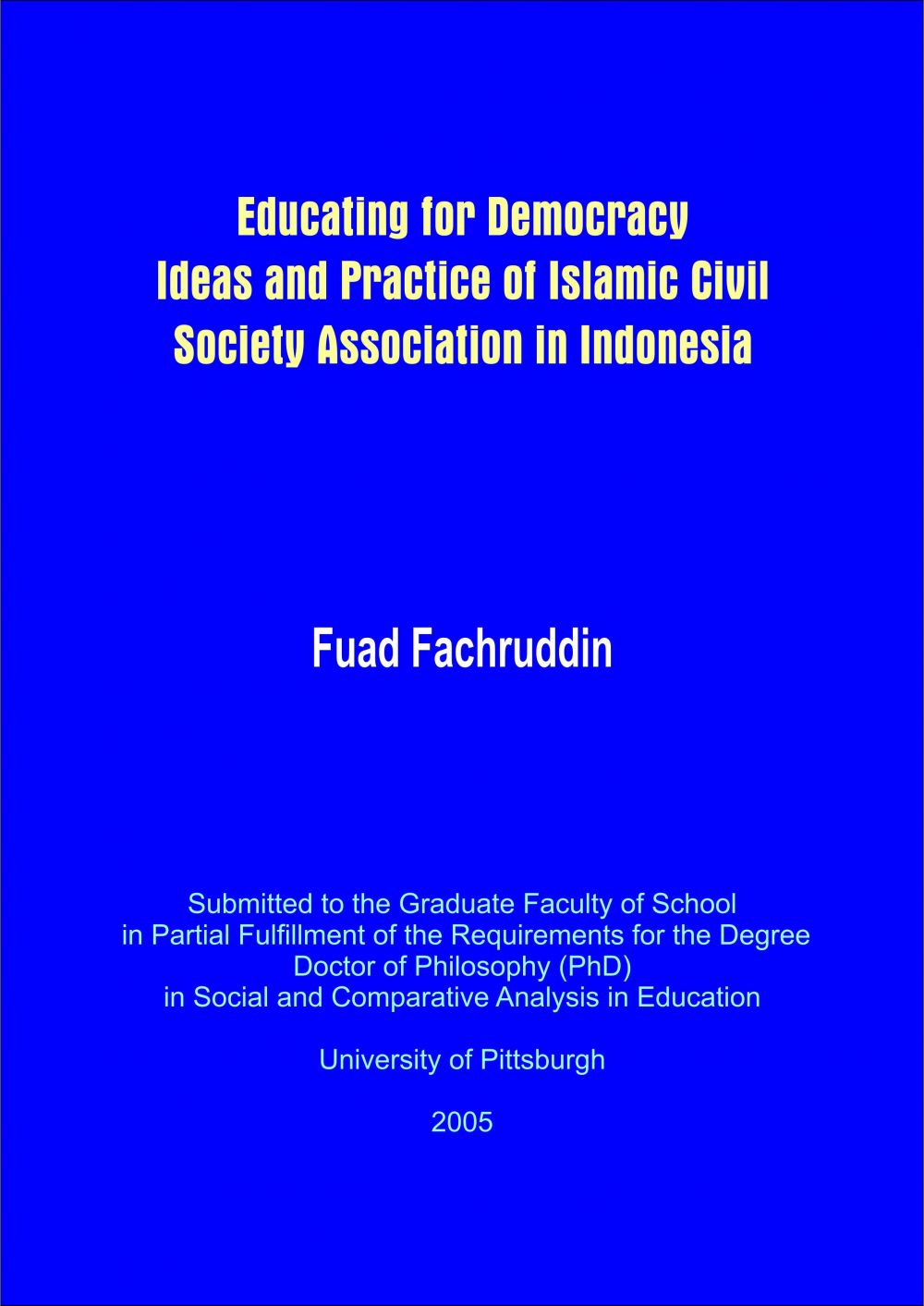Educating for Democracy: Ideas and Practices of Muhammadiyah and Nahdlatul Ulama
Dibaca: 1484
Penulis : Fuad Fachruddin
Educating for Democracy: Ideas and Practices of Islamic Civil Society Association in Indonesia
Fuad Fachruddin
Abstract
The central question addressed in this study is “How are the conceptualization and operationalization of education for democratic citizenship similar to or different within and across the two Islamic civil society associations.” Using qualitative methods, I explored the ideas and experiences (practices) of two large Islamic civil society associations: Muhammadiyah (M) and Nahdlatul Ulama (NU), in Indonesia.
Muhammadiyah and NU members have similar ideas about democracy, democratic society and educating for democracy. Within both organizations members argue Islam has tenets, such as shura and adl (justice), congruent with democratic ideas, but their responses to the Western conceptions of democracy vary. Accomodationists in both organizations state that Islamic tenets are conglruent with the Western ideas of democracy, while rejetioinists express that Islam has concept of happiness as the goal of democracy, sovereignty, and freedom differ from Western concepts of democracy. Moreover, although most informants from M and NU subscribe to democratic values, such as individual freedom, respect for differences or plurality, tolerance, open-mindedness, and criticism; some see the notionsindividual sovereignty, accepting of other religious groups’ beliefs, and gender equality as problematic for Muslims in Indonesia. Adopting these values in certain ways, they argue, can be seen to contravene core/fundamental Islamic beliefs.
Muhammadiyah and NU work to educate their members and the community at large by promoting democratic or civil values, political awareness, and participation. Both organizations have developed voter education and education for anti-corruption programs. In addition, NU organizes programs to transform orthodox understandings about the fiqh tradition, “citizen forums” to influence the provision of public services, and workshops to disseminate ideas of “inclusive, emancipatory or moderate Islam.” M’s programs focus on developing gender sensitivity among officials, candidates, and community members as well as on developing civil values for the students of its schools and colleges through civic education.
TABLE OF CONTENTS
1. BACKGROUND AND STATEMENT OF THE PROBLEM - 1
1.1. Indonesia, Islam and Democracy - 1
1.2. Democratization and Education for Democracy in Indonesia - 5
1.2.1. The Old Order - 5
1.2.2. The New Order - 8
1.2.3. The Era of Reformasi - 13
1.3. Education for democracy - 14
1.4. Islamic Civil Society Associations and Education for Democracy - 16
1.5. Research Problem - 21
2. FRAMING EDUCATION FOR DEMOCRATIC CITIZENSHIP - 23
2.1. Democracy, Citizenship and Civil Society - 23
2.1.1. Democracy - 23
2.1.2. Citizenship - 31
2.1.3. Civil Society - 35
2.2. Education for Democratic Citizenship - 39
3. METHODOLOGY - 43
4. M AND NU AND DEVELOPMENT OF DEMOCRACY - 57
4.1. Muhammadiyah and democracy development - 58
4.1.1. Muhammadiyah in relation to the state - 58
4.1.1.1. M and the Order regime of Soekarno - 58
4.1.1.2. M and the New Order regime of Suharto - 59
4.1.1.3. M’s critical stance: High politics and “social tawheed” - 70
4.1.2. Role of Muhammadiyah in promoting democracy - 75
4.2. NU and the process of Democratization - 80
4.2.1. NU in relation to the state - 80
4.2.1.1. NU and the Old Order of Soekarno - 82
4.2.1.2. NU and the New Order of Suharto - 84
4.2.2. NU role in promoting democracy - 87
5. CASE 1: MUHAMMADIYAH’S IDEAS AND PRACTICES ON DEMOCRACY AND EDUCATING FOR DEMOCRACY - 92
5.1. Democracy - 92
5.1.1. How do Muhammadiyah’s people perceive democracy? - 92
5.1.1.1. Substantive democracy - 93
5.1.1.2. Procedural Democracy - 94
5.1.2. Compatibility and incompatibility of Islam with democracy - 96
5.1.2.1. Islam is compatible with democracy - 96
5.1.2.2. Islam is Incompatible with democracy - 98
5.1.2.3. Islam is not comparable to or distinguishable from democracy - 99
5.1.3. Muhammadiyah’s Members views about western ideas of democracy - 101
5.2. Democratic Society - 104
5.2.1. Conceptualization - 104
5.2.2. Description of the characteristics of democratic society - 108
5.2.1.1. Individual freedom - 108
5.2.1.2. Pluralism - 109
5.2.1.3. Tolerance - 125
5.2.1.4. Gender equality - 129
5.2.1.5. Criticism and critical groups - 140
5.3. Citizenship - 144
5.3.1. How does Muhammadiyah conceive of citizenship - 144
5.3.2. Loyalty and commitment - 148
5.4. Educating for democracy - 150
5.4.1. What do M people understand about educating for democracy - 151
5.4.2. The manifestation of educating for democracy (kinds/models - 156
5.4.2.1. Civic education - 157
5.4.2.2. Voter education - 165
5.4.2.3. Education for political awareness among females (gender appreciation)168
5.4.2.4. Educating for anti-corruption - 171
6. CASE 2: NU’s CONCEPTUALIZATION OF DEMOCRACY AND EDUCATION FOR DEMOCRACY - 177
6.1. Democracy - 179
6.1.1. Substantive democracy - 179
6.1.2. Procedural democracy - 182
6.1.3. Democracy and Islam - 184
6.1.3.1. Islam is compatible with democracy - 184
6.1.3.2. Democracy is incompatible with Islam - 184
6.1.3.3. Those who have an idea in between the previous groups - 187
6.2. Democratic Society - 188
6.2.1. Conceptualization of democratic society - 188
6.2.2. Description of charactristics of democratic society - 189
6.2.2.1. Individual freedom - 189
6.2.2.2. People’s (individual’s) sovereignty - 191
6.2.2.3. Pluralism - 192
6.2.2.4. Tolerance - 195
6.2.2.5. Gender equality - 196
6.2.2.6. Criticism and being critical - 203
6.3. Citizenship - 205
6.4. Educating for democracy - 206
6.4.1. Transforming ways of thinking of kiyais - 206
6.4.1.1. Approach and Activities - 208
6.4.2. Disseminating the idea of Moderate Islam the community at large - 213
6.4.3. Deliberative democracy: Education for Democracy - 214
6.4.1.2. Objective: knowledge or skill developed within public - 215
6.4.1.3. Coverage areas, approach, and citizen forums - 216
6.4.2. Voter education - 218
6.4.3. Education for anti-Corruption Movement - 220
6.4.3.1. Stage and activities - 221
6.4.3.2. Issue of investigation techniques - 222
7. COMPARATIVE ANALYSIS - 224
7.1. The ideology underpinning M and NU - 224
7.2. Democracy - 228
7.3. Democratic society - 233
7.3.1. Individual freedom and sovereignty - 234
7.3.2. Pluralism and tolerance - 235
7.3.3. Gender equality - 238
7.3.4. Criticism & being critical - 240
7.4. Citizenship - 243
7.5. Educating for Democracy - 245
8. CONCLUSIONS AND RECOMMENDATION - 249
8.1. Summary - 249
8.2. Implication and Recommendation - 254
8.2.1. Perspective - 255
8.2.2. Policy Issues - 258
APPENDIX A: List of Terms (Glossary)- 262
APPENDIX B: Interview Guide - 271
APPENDIX C: Approval Letter from Muhammaddiyah - 274
APPENDIX D: Letter from the President of Muhammadiyah University of Yogjakarta - 275
BIBILIOGRAPHY - 277
Continue reading or DOWNLOAD HERE
Tags: EducatingforDemocracy:IdeasandPracticesofMuhammadiyahandNahdlatulUlama , FuadFachruddin








